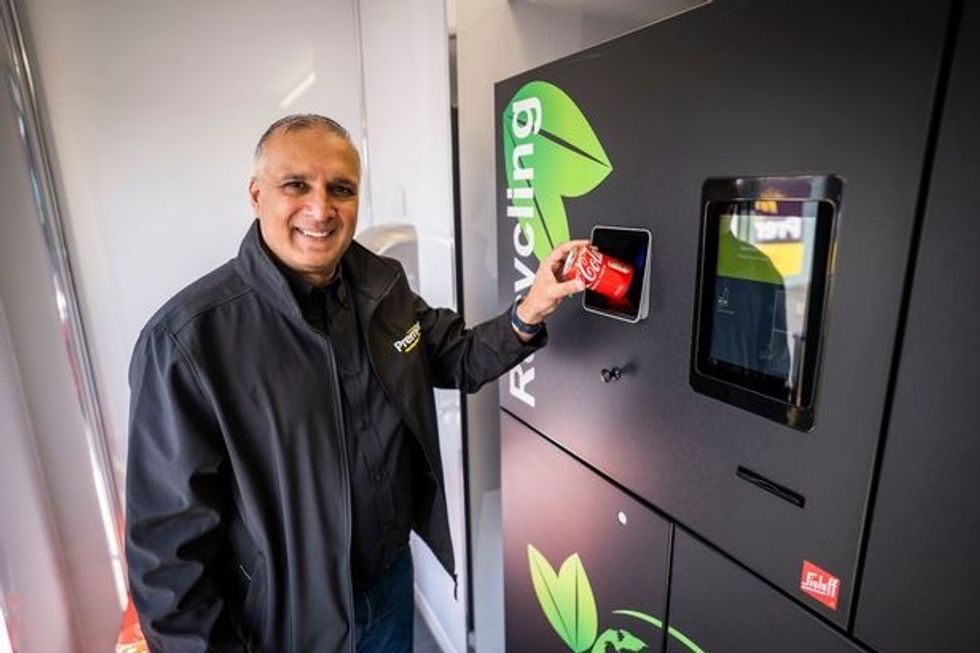Rather than becoming UK’s first-of-its-kind recycling initiative, Scotland’s Deposit Return Scheme (DRS) has become a victim of political agendas and hidden motives, Asian Trader has learnt, leaving retailers to bear the brunt of this half-baked government policy.
Scotland's DRS has now been pushed back to October 2025, in line with the rest of the UK. It was supposed to come into effect in March 2024. The decision to delay the scheme was announced on June 7 by minister for green skills, circular economy and biodiversity Lorna Slater.
In May 2019, the Scottish government revealed its design for a deposit return scheme, including the proposed 20p deposit and target materials. In May 2020, the Scottish Parliament voted to approve these regulations, establishing Scotland’s national deposit return scheme.
Two years later, UK government published its response to a formal request from Scottish ministers, under which it granted a partial exemption to the Internal Market Act which would exclude glass containers from the DRS.
UK government's move sparked a political row between Edinburgh and London. In a letter to prime minister Rishi Sunak, first minister Humza Yousaf urged to grant a full exclusion for Scotland's DRS. Giving an ultimatum of a few days to the UK for a response, he also cited that excluding glass would put Scottish businesses at a competitive disadvantage.
As London did not budge in response to his request, Slater delayed the scheme altogether for more than two years, thus putting a screeching brake on the progress made by retailers, makers and other stakeholders in this regard.
Circularity Scotland, which was appointed as DRS administrator by the Scottish government, reportedly claims the scheme has become “mired” in political differences which have obscured the environmental and financial benefits of DRS. Interestingly, Circularity Scotland was still “optimistic” it can proceed without glass.
In a glass darkly
The UK government had received a formal request for an exemption under the UK Internal Market Act for this on March 6 this year. Westminster said the exemption was being granted in “good faith” though the decision to withhold glass from this scheme did not go down well in Scotland.
Rest of the UK’s DRS does not include glass after a consultation raised concerns that mixing different glasses would lead to poorer quality glass when recycled, safety concerns for those handling the material, concerns over the weight of the material for transport, and the potential for an increase in handling costs and equipment complexity.
Noteworthy here is that the government’s decision of excluding glass from DRS in England and Northern Ireland (and now Scotland) was actually a blatant U-turn from the 2019 Conservative manifesto that promised introduction of a deposit return scheme “to incentivise people to recycle plastic and glass”.
Serious allegations are now being raised, indicating that government and businesses were hands-in-glove to safeguard their vested interest, making sure glass (and thus wine and whiskey firms) is removed from this scheme.
The word on the grapevine is that a leading Scottish Conservative Party politician, who has openly backed calls for glass to be taken out of the Scottish Government’s DRS, is a major shareholder in a whisky distillery and holds shares in a bottler company as well.
Also, there are reports that the UK government is being urged to explain the “striking coincidence” of a £20,000 donation from a trade body after changing their position over glass in deposit return schemes.
In the words of Scottish Greens environment spokesperson Mark Ruskell MSP, “We have a Scotland Office Minister who owns shares in the whisky industry, an MSP who on multiple occasions accepted hospitality from a beer manufacturer, and a party that accepted tens of thousands of pounds of donations from the wine and spirits industry.”
“All of which has been properly recorded. But it begs the very serious question- who stands to benefit from the Tories dropping their manifesto commitment to glass and why did they decide to do so at a time when we so urgently need action to protect the environment?”
Mo Razzaq from the Federation of Independent Retailers agrees that it is politics that spoiled things.
“There are concerns about communication, and the two governments should be more in partnership with detail,” Razzaq told Asian Trader.

“Earlier there were no concerns raised by the Westminster Government. And all of a sudden, they decided to take glass out of the equation altogether! What we are now seeing is that politics got involved in this which clearly did not help at all.”
“The Westminster government did not agree that glass should be included. But they have not given any answers too to what they’re going to do with glass- which is even more disappointing. If you’re going to take glass out of the scheme, also inform what are you going to do with glass,” Razzaq told Asian Trader.
Colin Wilkinson from Scottish Licensed Trade Association (SLTA) has stated that it is hugely disappointing that DRS – something that should be a force for good – has been reduced to “a tardy political battle”.
“Businesses deserve better than this,” Wilkinson said.
Compensation
Now that all is said and done, it clearly seems a political mess as someone out there- either in UK or in Scotland or at both the places- failed to do his homework properly. Like, clarifications over regulations could have been sought earlier, way before retailers and other industry stakeholders invested in the reverse vending machines and other requirements.
Pete Cheema, chief executive of the Scottish Grocers Federation, said the delay was expected but the government "should have clarified all of these points well before imposing regulations of the producers and the retailers" and the “blame lies within the Scottish government”.
"We always said this deposit return scheme is not industry-led, and had it been industry-led, they would've listened to us in the first place. Businesses will have machines that have glass in scope and now it's out of scope," he said.
For next two years with no major use, Scottish retailers are now "trapped in contracts with reverse vending companies" which cost an average of almost £4,000 a year. Cherry on the top here is some of these machines also include glass recycling. Some even had to make changes and renovations around the shop to fit these machines.
Razzaq has said he is considering the legal route in this matter to seek compensation.
"We are expecting Scottish government to pay us as we were told the scheme will go ahead and now it won't be going ahead for a couple of years. A lot of retailers took Scottish government in good faith and made arrangement,” Razzaq told Asian Trader.
Michael Topham, Chief Executive of BIFFA, said that, as the logistics partner for the scheme, Biffa has already invested £65 million under the assumption that glass will be included. He has also declared that Biffa would seek to “claw back at least some of the £65 million it has invested in the DRS”.
British Soft Drinks Association, trade association which represents many major soft drinks companies including Coco-Cola, A.G. Barr and Innocent Drinks, too has confirmed to Asian Trader that it’s seeking compensation from the Scottish government over the delay. The association has also demanded the UK government to publish a blueprint for how it intends to achieve an October 2025 start date, particularly regarding how it intends to fulfill the conditions set out in its letter to the Scottish government.

Meanwhile, Yousaf seems to be now washing hands over what the government seemingly owes to businesses, saying the fault lies with the UK government.
“We don’t believe there’s a case for the Scottish Government to need to compensate because the action we’ve had to take is because of that eleventh, last-minute intervention from the UK Government, which has meant that a Scottish scheme, unfortunately, isn’t viable,” Yousaf said in BBC’s Sunday with Laura Kuenssberg show on June 11.
Yousaf’s statement has drawn a strong criticism from retailers.
Reacting sharply to his comments, Razzaq from Fed said that the Scottish government’s claim to seek an improved relationship with businesses will have “faint credibility if it seeks to evade paying compensation”.
“How can the Scottish government claim that there is no case to answer? It told us repeatedly to get ready for this scheme. Shopkeepers who took out leasing contracts are paying almost £4,000 a year for now-redundant machines to process returned bottles and cans,” he said.
What next?
With too many twists and turns and surprises to keep a tab on, Scotland’s DRS seems no less than a fast-paced dramatic soap opera. Also, on the other hand, the delay until a UK-wide scheme has given a breathing space for the small producers and local retailers, some of whom are not very enthusiastic about the scheme anyway.
In the words of Glasgow-based retailer Girish Jeeva, he is among the “safe ones” who thought to wait until a couple of months more and that is why, he did not buy any equipment or paid any money for a reverse vending machine.
“I am, along with most of the retailers, kind of against the scheme as it is expected to affect the business quite a lot with multipack sales decreasing and the whole complicated system of customers having to pay extra money. To be honest, I'm just glad that it hasn't gone ahead,” Jeeva told Asian Trader.
SLTA is now calling on to take “grown-up” approach to DRS and leave “politics out of it”.
“The next steps must be the right steps with both the Scottish and UK governments and industry taking a grown-up approach – focusing on what is right for businesses and consumers – and leaving politics out of it,” he added.
October 2025 seems far as of now, but Razzaq feels that England needs to speed up if they want to meet the deadline.
“Unless England speeds up, it will be difficult to meet October 2025 deadline. They are expecting a lot of work to be done in a very short space of time.
“There are so many learning from Scottish scheme showing there is a lot of work to be done. A company that will run the deposit return scheme in England has not signed off yet and is only going to be nominated next year. With that timeline, that company will have just over a year to set up the scheme and I think that that’s not long enough. The company will need much more time as it needs to get things streamlined under regulations. We also got a general election next year. So like I said, there’s a lot of work to be done in a very less time,” he concluded.
However, the latest twist in this soap opera throws up another important question- will the UK be able to clear its differences, buckle up and actually be able to implement the scheme by October 2025 or this all is just a mirage?






